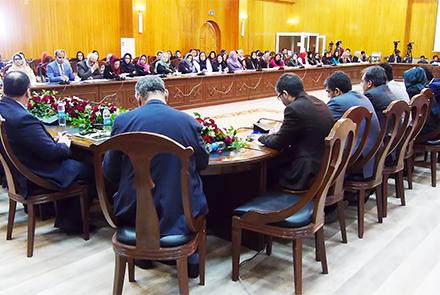CEO Abdullah Abdullah on Tuesday warned that settlements in some regions of the country will not be possible in future if action is not taken to safeguard the country’s water resources.
He said that although the ministry of water and energy and other relevant institutions have launched a number of programs to tackle the issue there is still a need for collective efforts of all institutions and the people to overcome the challenge.
“If we do not make these part of the lessons for our sons of this country, tomorrow the continuation of life in some regions of our country will be impossible,” said Abdullah.
Meanwhile, officials at the ministry of water and energy have stressed the need for a larger presence of women on a leadership level in water management programs.
Speaking at a ceremony organized by the ministry of water and energy under the motto “Improving the Role of Women in Water Management”, the minister of water and energy Ali Ahmad Osmani said that most water is used by women in their homes and that they can play an effective role in saving the resource.
He said women should also be hired at a leadership level in government and at private institutions.
“The role of women in the leadership and management of water resources units, including the ministry of water and energy, and other institutions which are currently working with the management and consumption (of water) is not too encouraging or acceptable,” said Osmani.
Delegates at the gathering said women are the first who would be vulnerable if there were water restrictions.
Osmani said that women in Ghor and Badghis are already grappling with the issue of a lack of access to water.
“In many places, the level of underground water has dropped by 20 meters and the majority of our water has become polluted,” said Muzghan Mustafawi, deputy minister of information and culture.
“As you know our women are dealing with water on a daily basis, they have an upper hand in terms of saving water,” said Shakeela Nazari, head of public relations department of ministry of women affairs.
According to the ministry of water and energy, the population growth has had an enormous impact on water resources in the country.

